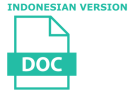Project Based Learning di Kelas Terjemahan Bahasa Asing untuk Pendidikan Vokasional
Ahmad Muam(1*)
(1) Universitas Gadjah Mada
(*) Corresponding Author
Abstract
The research aims to identify obstacles and possible challenges in deploying project based learning as learning method for translation course in vocational education. Given that vocational education should shorten the gap between well-equipped skill of graduate with labor market demand, each courses offered are obliged to ensure that skill delivered in the course are practically in line with labor demand and are ready to use, including translation courses. The research adopted qualitative approach and putting case study method completed by interview and survey as method of data collection. The interview was intended to dig the faculty’s experience in facilitating translation courses in class within last one year period, particularly on its challenges and obstacles. Meantime, the survey was designed to absorb the learner’s perception and opinion towards the advantages of project based learning implementation. The respondent involved in the research are students of English program Vocational College Universitas Gadjah Mada who already taken translation 1 and 2 courses. Next, The data are descriptively presented along with related supporting figures and tables. The research reveals that in the context of vocational education, translation teaching using project based learning offers a lot of advanteges to the students particularly in equipping them with proper undersntading on conceptual knowledge and its practical implementation in work place. However, its implementation hit some obstacles which could be derived as follow 1. Lack or time preparation and length of time to conduct the team project, 2. Lack of lecturer’s experience in delivering PBL in class.
Keywords
Full Text:
PDFReferences
Bell, S. (2010) Project-based learning for he 21st century : skills for the future. The Clearing House.83, 39-43.
David, J.L. (2008). What research says about/project-based learning. Educational leadership teaching students to think. 65,5 80-82
Dedouli, M. (2001). Experiential learning possibilities of development through the framework of flexible zone. Inspection of educational subject. 12, 6 3-8
Doppelt, Y. (2003). Impementation and assessment of PBL in a flexible environment. International Journal Of Technology And Design Education. 13, 255-72
Efstratia, D. (2014) Experiential education through project based learning. Procedia- social and behavioral sciences. 152. p. 1256-1260
Elmgrab, R.A (2013) implication for translation teaching pedagogy: a case of bengazi University: Akdeniz language studies conferene 2012: Procedia- social and behavioral sciences. 70, 358-369
Hager, P. 1995. Competency standards- a help or a hindrance ? Australian perspective. The vocational aspect of education. 47 (141-151)
Husinga. (2005). Curricullumforschung. Pp 350-361. Biefeld: Bertelsman
Lasauskine, J& Rauduvaite, A. (2015) Project based learning at university : teaching experiences of lecturers. Procedia- Social Behavior and sciences 197 (2015) 788- 792
Maag. M . 2008 . Cross-Curricular Competencies . Handbook Of Technical And Vocational Education And Training Research. Dordecht : Springer
Markhaam, T. (2011) Project based learning. Teacher librarian 39:2 38-42
Popescu, T (2013) Developing English linguistic student’s translation competence through the language learning process; 3th world conference on learning , teaching and educational leadership-WLCTA 2012. Procedia-social and behavorial sciences 93 p 1075-1079
Reuner F. 2010. Costs, benefits and quality of Apprenticeships .London : Springer
Robinson, D (2007) Becoming a translator : an introduction to the theory and practice of translation. Second edition. London : routlegde
Taylor , B. (1980) Adult language learning strategies and their pedagogical implication; for teachers and teacher’ trainees. In croft K (ed), reading on English as second language (144-152)
Tretten,R & Zachariou,P (1995) Learning about project based learning : assessment of project based learning in Tinkertech School. San Rafael. California: The autodesk Foundation
Williams, L (1986) Teaching for the two sided mind. A guide to the right /left mind education New York : Simons and Schuster
Zhao, Zhiqun & Runer, Felix . 2014. Areas of Vocational Education Research. Berlin : Springer-Verlag
Zhao , Z . 208. Development of Competency Learning in Building Automation in China (pp 247- 257) Rostock : pitbus
Article Metrics
Refbacks
- There are currently no refbacks.
Copyright (c) 2017 The Author(s)

This work is licensed under a Creative Commons Attribution-ShareAlike 4.0 International License.







